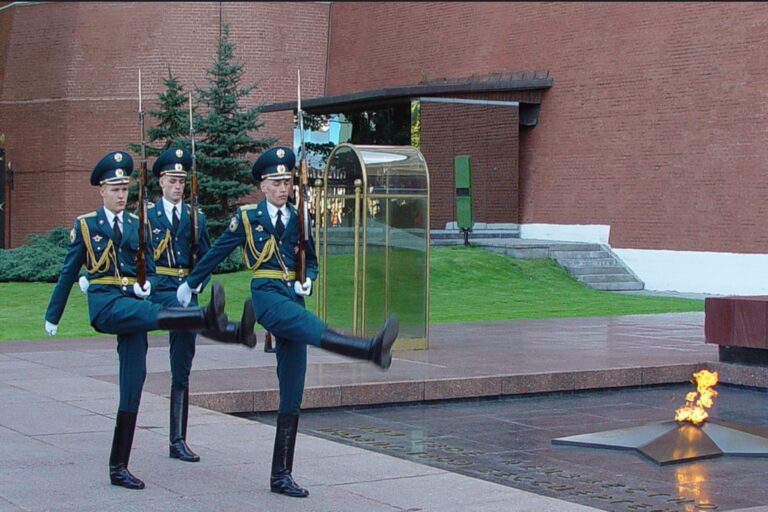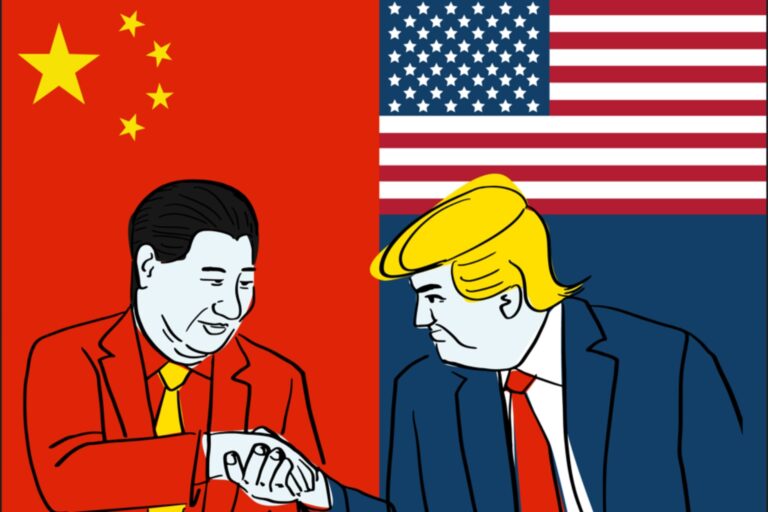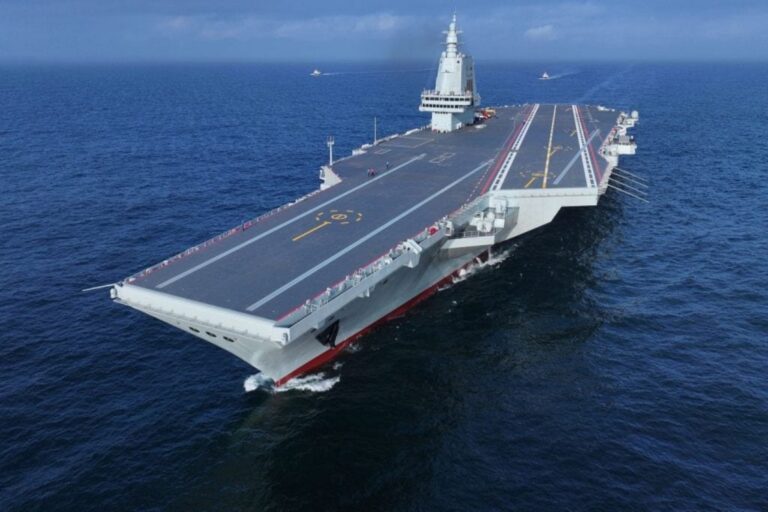In our previous article we observed that in a world dominated by realists, academics are more likely to focus on strategic studies and not international law.[1] We nevertheless found noteworthy the extent to which international law enters into strategic thought to: (i) coalesce rules of international behaviour, (ii) construct an international consensus, (iii) chart a moral roadmap, and (iv) establish a basis for economic and political measures. In summary, the first article concluded that international law has a strategic function—it can be used as a tool to build alliances among like-minded states.
In this article, we examine the flip side. We start from the premise that strategic thought that builds on international law is not always the norm and examine the consequences of ignoring international law. Russia and China are examples of outliers that increasingly fail to combine international law with their version of Realpolitik and are now paying the economic and political price. In effect, this is the same argument as before, but examined from the side of rule-breakers—or to paraphrase Lao Tsu—we examine how States experience defeat when they go against international law. In this article, we look at the defeats suffered by Russia and comment on whether a more aggressive legal approach would have prevented Russia’s invasion of Ukraine.
Even the finest warrior is defeated when he goes against natural law. By his own hand he is doomed and all creatures are likely to despise him.
Lao Tzu, Tao Te Ching, Verse 31.
Russia
The case of Russia is instructive due in part to the Russian Federation’s evolution and subsequent devolution from a regime based on the rule of law. Evolution can be seen in Article 15(4) of the December 1993 Russian Federation’s Constitution which adopts a “monist” approach elevating international law above Russian law.[2] This progressive step, which gave priority to international treaties over Russian domestic law,[3] was followed in December 1994 by the Budapest Memorandum[4] setting forth Russia’s commitment “to respect the independence and sovereignty and the existing borders of Ukraine” and reaffirming Russia’s “obligation to refrain from the threat or use of force against the territorial integrity or political independence of Ukraine…”.Russia’s legal evolution culminated in the additional reforms accompanying its 1996 accession to the European Convention on Human Rights, and its 1998 Council of Europe membership.[5]
Russia’s legal evolution was short-lived, and its devolution has been nothing short of dramatic.[6] In each instance, Russia’s violations of its legal obligations resulted in important consequences:
- In late February 2014, Russia occupied Crimea and formally annexed it on 18 March 2014. As a direct result of Russia’s decision to annex Crimea, on 24 March 2014 the remaining members of the G8 (now the G7) suspended Russia’s membership.
- In December 2015 Russia began its formal retreat from its legal obligations under the European Convention on Human Rights. Russia had joined the Council of Europe in February 1996 and ratified the European Convention on Human Rights (ECHR) in May 1998 thereby accepting the jurisdiction of the European Court of Human Rights. However, judgments against Russia mounted rapidly and in December 2015 Russia amended its law on the Constitutional Court, granting the Court power to determine whether it was possible to implement an ECHR judgment. If the Court determined that it was not possible to implement an ECHR judgment, it was granted the authority to prohibit “any measures aimed at enforcing” it.[7] Additionally, in 2020 Russia introduced a constitutional amendment which secured the primacy of the Russian Constitution over international law, thereby constitutionally entrenching what Russia had effectively been practicing since 2015.[8] These amendments gutted enforcement of the ECHR in Russia, and resulted in the 16 March 2022 decision of the Committee of Ministers of the Council of Europe to exclude Russia from membership.[9] The 2020 constitutional amendment demonstrates Russia’s turn away from rule of law, and a return to the Soviet approach to international law, where demands for state sovereignty trump international legal obligations.[10]
- Russia’s February 2022 invasion of Ukraine constitutes a violation of Article 2(4) of the UN Charter (requiring UN Members to “refrain in their international relations from the threat or use of force against the territorial integrity or political independence of any state…”). Among the consequences that followed was the imposition of economic and political sanctions by many Western countries. They include the freezing and seizure of assets, sanctions against individuals, banks and companies, loss of access to the Swift international bank messaging system, selective bans on the import of Russian coal, refined oil, natural gas, and diamonds, a $60 cap on Russia’s crude oil exports, bans on the export of dual-use goods to Russia, suspension of broadcast activities of certain Russian media outlets, and bans on flights and overflights by Russian carriers, and prohibitions on the entry of Russian road transport operators, and port closures for certain Russian maritime transport vessels.[11]
- Russia’s veto on 25 February 2022 of a UN Security Council Resolution demanding its withdrawal from Ukraine led the General Assembly to apply the Uniting for Peace Resolution. The General Assembly may invoke this resolution when the Security Council is prevented “from exercising its primary responsibility for the maintenance of international peace and security”.[12] Pursuant to this resolution on 23 February 2023 141 UN Members reiterated their demand that Russia “immediately, completely and unconditionally withdraw all of its military forces from the territory of Ukraine and called for a cessation of hostilities”.[13] Only seven UN Members, mostly Russian client-states, voted against it.[14] Although the resolution is toothless, it demonstrates the widespread opposition of the vast majority of UN members to Russia’s aggression.
- Finally, Russia’s decision to ignore international law by annexing Crimea, invading Ukraine, then annexing, and establishing partial control over Donetsk, Kherson, Luhansk, and Zaporizhzhia oblasts led to what may be the worst consequences for Russia—a more unified NATO that continues to supply advanced weaponry to Ukraine, the continued expansion of NATO to include Finland (which shares a 1,340 km border with Russian), and most recently Sweden. The probability remains that once the war ends, Ukraine will also join NATO.
History has a way of repeating itself, often in inconvenient ways. Western scholarship has been criticised for overlooking Russia’s imperialist past. Yet, as with German history, we have come full circle, with some academics calling for the establishment of a “new Nuremberg-like special tribunal” to hold Russia’s leadership responsible for its “crimes against peace” and its “war of aggression against Ukraine” (concepts pioneered by Aron Moishe Trainin, a Soviet lawyer who helped draw up the Nuremberg Charter).[15] By going against international law, Russia has turned itself into a pariah state (despised as Lao Tzu predicted), compounded economic difficulties for its companies and citizens, and fuelled the growth and solidarity of the NATO alliance. Sergei Lavrov, Minister of Foreign Affairs of the Russian Federation, may have been right when he said in 2013:
… you cannot strengthen the law by violating the law. If you say that your national law allows you to do something, it is fine as long as you do this inside your own territory. As long as you go international, you really have to be sure that there is an international law which you respect and which you follow.[16]
Final Thoughts
Russia’s failure to abide by its international and regional legal obligations resulted in Russia’s ostracism from the European human rights regime, the Council of Europe and, with very limited exceptions the international community. When Russia’s invasion of Ukraine is viewed in light of its previous aggression in Georgia and Moldova, the international community must wonder whether Russia has begun a revanchist crusade. At least with respect to Ukraine, the international community responded, even if insufficiently. While Russia retains varying degrees of support among the BRICs states,[17] it may not be enough to undermine the effects of the economic and political sanctions, immense loss of reputation, geopolitical losses due to NATO’s expansion, and the likelihood that Ukraine will eventually join NATO.
Using the perfect vision that hindsight offers, it is easy to identify missed opportunities where legal mechanisms, in particular treaties, could have been used to limit the possibility of Russian aggression. The EU was slow to bring Ukraine into the Western European fold. Ukraine’s formal relationship with the European Union began on 14 June 1994 with the adoption of a Partnership and Cooperation Agreement (replacing the 1989 Trade and Cooperation Agreement with the Soviet Union).[18] However, Ukraine and the EU did not sign the political chapters of an Association Agreement until March 2014, just after the February ouster of Ukraine’s pro-Russian President, Viktor Yanukovych (who had delayed its signature), and just after Russia’s February occupation of Crimea. The remaining chapters of the Association Agreement were not signed until June 2014.[19] Despite the existence of the Association Agreement, Ukraine was not granted candidate status by the European Parliament and Council until June 2022—four months after the Russian invasion. Russia’s invasion has accelerated Ukraine’s EU candidacy, leaving one to wonder whether granting Ukraine EU candidacy earlier would have deterred Russia’s invasion.
Similarly, NATO members have been slow to bring Ukraine into the NATO alliance. Ukraine’s dialogue with NATO dates back to 1991[20] when Ukraine entered the North Atlantic Cooperation Council.[21] However, Ukraine’s cooperation with NATO did not begin to intensify until 2014, when Russia annexed Crimea.[22] The most important move did not come until the July 2023 NATO summit where President Biden and G7 leaders provided Ukraine with additional security guarantees and assured Ukraine that its future was in NATO once reforms were made and the war with Russia was over.[23] Again, one must ask whether admitting Ukraine to NATO before the Russian Annexation of Crimea and invasion of Ukraine (as was done with other former Warsaw Pact States) would have prevented the Russian invasion of Ukraine.
International law is a tool in the Realists armoury that encourages compliance with international norms. Likewise, the failure of a State to abide by its international obligations may distance a State from the community of nations, weaken its international influence, and result in relative isolation. The question remains—how can rule-abiders profit strategically when rule-breakers seriously misstep and isolation results? This is a question of statecraft. Serious violations of international law place rule-breakers in a vulnerable position and provide rule-abiders an opportunity for strategic action. But often strategic action comes too late and is a second-best solution. Had the West opted for a more aggressive legal approach—treaties admitting Ukraine to NATO and the EU—Russia is unlikely to have invaded Ukraine.
Arthur Appleton is an Adjunct Professor of International Law, Johns Hopkins School of Advanced International Studies (SAIS Europe), Visiting faculty and Advisory Board Member World Trade Institute (University of Bern); Partner, Appleton Luff – International Lawyers.
Justin Frosini is a Robert J. Abernethy Adjunct Professor of Constitutional Law at SAIS Europe; Director of the Center for Constitutional Studies and Democratic Development; and Associate Professor of Comparative Public Law at the Luigi Bocconi University.
The authors would like to thank Viktoriia Lapa for her helpful comments.
Notes
[1] Appleton, Arthur and Frosini, Justin, “International Law’s Role in a Strat-Dominated World.” The SAIS Europe Journal of Global Affairs, 2023. https://www.saisjournal.eu/article/84-International-Laws-Role-in-a-Strat-Dominated-World.cfm
[2] Article 15(4) provides: “The universally-recognized norms of international law and international treaties and agreements of the Russian Federation shall be a component part of its legal system. If an international treaty or agreement of the Russian Federation fixes other rules than those envisaged by law, the rules of the international agreement shall be applied.” http://www.constitution.ru/en/10003000-02.htm
[3] Jeffrey Kahn, “The Rule of Law under Pressure: Russia and the European Human Rights System,” Review of Central and East European Law 44 (2019) 275, 286-287.
[4] See Paragraphs 1 and 2 respectively of the Memorandum on Security Assurances in Connection with Ukraine’s Accession to the Treaty on the Non-Proliferation of Nuclear Weapons. Budapest, 5 December 1994, https://treaties.un.org/doc/Publication/UNTS/Volume%203007/Part/volume-3007-I-52241.pdf.
[5] Kahn, supra note 4, notes passage of a new criminal code (1996), a criminal procedure code (2001), a civil code (1999, 2001 and 2006), and a code of civil procedure (2002) as well as laws regulating the procuracy (1995), creating a commissioner for human rights (1997), protecting religious organizations (1997), national minorities (1999), and establishing a professional bar (2002).
[6] See Jeffrey Kahn, “Consistency and Change in Russian Approaches to International Law,” Lieber Institute, West Point, 9 March 2022, https://lieber.westpoint.edu/consistency-change-russian-approaches-international-law/.
[7] Kahn, supra note 4, at 288.
[8] Mälksoo, Lauri, “International Law and the 2020 Amendments to the Russian Constitution.” American Journal of International Law 115, no. 1 (2021): 78–93, DOI: https://doi.org/10.1017/ajil.2020.87.
[9] This occurred one day after Russia had informed the Council of its withdrawal and “its intention to denounce the European Convention on Human Rights.” Council of Europe Newsroom, “The Russian Federation is Excluded from the Council of Europe,” 16 March 2022, https://www.coe.int/en/web/portal/-/the-russian-federation-is-excluded-from-the-council-of-europe. Russia’s withdrawal as an ECHR party became effective on 16 September 2022, six months after its exclusion from the Council. Despite ceasing to be a party, the ECHR maintains jurisdiction over applications filed before 16 September, which numbered at that time 17,450. Furthermore, at least on paper, Russia remains “obligated” to implement the existing 2,129 judgments and decisions. Council of Europe Newsroom, “Russia ceases to be party to the European Convention on Human Rights,” 16 September 2022, https://www.coe.int/en/web/portal/-/russia-ceases-to-be-party-to-the-european-convention-on-human-rights.
[10] Mälksoo, Lauri, supra note 9.
[11] See, e.g., “EU sanctions against Russia explained,” https://www.consilium.europa.eu/en/policies/sanctions/restrictive-measures-against-russia-over-ukraine/sanctions-against-russia-explained/#transport.
[12] This is in line with General Assembly resolution 377 A (V) of 3 November 1950.
[13] UN News, UN General Assembly calls for immediate end to war in Ukraine, 23 February 2023, https://news.un.org/en/story/2023/02/1133847.
[14] Belarus, North Korea, Eretria, Mali, Nicaragua, Russia and Syria voted against. There were 32 abstentions, including India, Pakistan, and China, as well as many Central Asian countries that were formerly a part of the USSR.
[15] See Francine Hirsch, Just Security, “How the Soviet Union Helped Establish the Crime of Aggressive War,” 9 March 2022, https://www.justsecurity.org/80599/how-the-soviet-union-helped-establish-the-crime-of-aggressive-war/.
[16] Sergei Lavrov, “Lavrov: 6-9 months enough to resolve Iran nuclear issue,” RT, Oct. 8, 2013, https://www.rt.com/russia/official-word/iran-cooperation-interview-lavrov-904/.
[17] As demonstrated by the 2023 BRICs Summit, China, India, Brazil and South Africa remain willing to maintain relations with the Russian Federation. Council on Foreign Relations, “The BRICS Summit 2023: Seeking an Alternate World Order?” Global Memo Brief, 31 August 2023, https://www.cfr.org/councilofcouncils/global-memos/brics-summit-2023-seeking-alternate-world-order.
[18] “EU/Ukraine Partnership and Cooperation Agreement, European Commission,” CORDIS, https://cordis.europa.eu/article/id/2672-euukraine-partnership-and-cooperation-agreement.
[19] “EU-Ukraine Association Agreement,” https://www.eeas.europa.eu/sites/default/files/071215_eu-ukraine_association_agreement.pdf.
[20] NATO, “Relations with Ukraine,” https://www.nato.int/cps/en/natohq/topics_37750.htm.
[21] In 1994 Ukraine entered NATO’s Partnership for Peace programme, and in 1997 the Charter on Distinctive Partnership which established the NATO-Ukraine Commission. See Hans Binnendijk and Franklin D. Kramer, “Providing long-term security for Ukraine: NATO membership and other security options,” Atlantic Council Issue Brief, 23 May 2023, https://www.atlanticcouncil.org/in-depth-research-reports/issue-brief/providing-long-term-security-for-ukraine-nato-membership-and-other-security-options/.
[22] In July 2016 NATO support for Ukraine was set forth in a Comprehensive Assistance Package. See NATO, “NATO steps up support for Ukraine with Comprehensive Package of Assistance,” 15 June 2016, https://www.nato.int/cps/en/natohq/news_132355.htm.
[23] CNN, “Assurances that Ukraine’s future is in NATO and new security guarantees calm worries at final day of summit,” 12 July 2023, https://edition.cnn.com/2023/07/12/politics/joe-biden-nato-summit-day-2/index.html.




